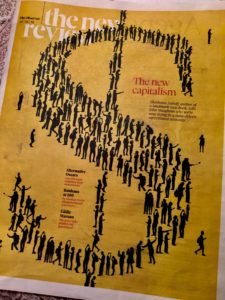In the picture
Dead Wood
Surveillance Capitalism: a review and an exchange
My Observer cover story on Shoshana Zuboff’s In the Age of Surveillance Capitalism — Observer, 21 January, 2019.
Why, sooner or later, societies are going to have to rein in the tech giants
My OpEd piece in yesterday’s Observer:
Spool forward to the tragic case of Molly Russell, the 14-year-old who killed herself after exploring her depression on Instagram. When her family looked into her account, they found sombre material about depression and suicide. Her father said that he believed the Facebook-owned platform had “helped kill my daughter”. This prompted Matt Hancock, the health secretary, to warn social media platforms to “purge” material relating to self-harm and suicide or face legislation that would compel them to do so. In response, Instagram and Pinterest (another social media outfit) issued the standard bromides about how they were embarking on a “full review” of their policies etc.
So is Molly’s case a crisis or a scandal? You know the answer. Nothing much will change because the business models of the platforms preclude it. Their commercial imperatives are remorselessly to increase both the number of their users and the intensity of those users’ “engagement” with the platforms. That’s what keeps the monetisable data flowing. Tragedies such as Molly Russell’s suicide are regrettable (and of course have PR downsides) but are really just the cost of running such a profitable business.
Asking these companies to change their business model, therefore, is akin to “asking a giraffe to shorten its neck”, as Shoshana Zuboff puts it in her fiery new book, The Age of Surveillance Capitalism…
How life begins
This is truly extraordinary. A six-minute time-lapse video of how a single cell turns into a tadpole in three weeks. It’s a film of an organism running the code in its DNA. I’ve read about this but always had to imagine what was going on. To see it is awe-inspiring.
HT to Kottke
How the technical is political
This morning’s Observer column:
The only computer game I’ve ever played involved no killing, zombies, heavily-armed monsters or quests for hidden keys. It was called SimCity and involved developing a virtual city from a patch of undeveloped land. The game enabled you to determine where to place development zones, infrastructure (like roads and power plants), landmarks and public services such as schools, parks, hospitals and fire stations. You could decide the tax rate, budget and social policy for your city – populated by Sims (for “simulated persons”, I guess) who had to live and work in the three zones you created for them: residential had houses and apartment buildings, commercial had shops and offices and industrial had factories, warehouses, laboratories and (oddly) farms.
SimCity was the brainchild of Will Wright, a software developer who had first made a splash with a shoot-’em-up (well, bomb-’em-flat) video game in which the player controls a helicopter dropping bombs on islands. But he became more fascinated with the islands than with the weaponry and started to wonder what a virtual city would be like – and how it would work. What he came up with was magical for its time: it gave the player a feeling of omnipotence: you decided where Sims should live, whether their electricity should come from nukes, where schools and offices should be located, how much tax they paid…
What you discovered early on, though, was that your decisions had consequences…
Google pays more in EU fines than it does in taxes
From The Inquirer
INTERNET GIANT Google now pays more in European fines than it does in taxes, the firm’s fourth-quarter earnings have revealed.
Google owner Alphabet company reported Q4 revenues up 22 per cent to $39.28bn, while annual revenues were up 23 per cent to $136.8bn.
The company also took the time to separate out “European Commission fines” in its consolidated statements of income in the company’s accounts. These increased from $2.7bn in 2017 to $5.1bn in 2018, with a further €50m already set to be added to the bill for its first quarter and 2019 accounts, thanks to French data protection authority CNIL.
That compares to a provision for income taxes of just $4.2 billion for 2018, or 12 per cent of its pre-tax income.
Trump’s ‘shrunken presidency’
Tonight, apparently, Trump will finally get to make his State of the Union speech. John Cassidy has some interesting reflections on the shrunken state of his presidency:
The Harvard political scientist Richard Neustadt famously remarked that the Oval Office “is no place for amateurs.” This is because, as Neustadt pointed out in his book “Presidential Power and the Modern Presidents,” which was originally published in 1960, the Presidency is, structurally, a weak office. Its occupant has to deal with Congress and the courts as co-equal branches of government. Even inside the sprawling executive branch, it isn’t easy to direct Cabinet secretaries, agency heads, and career public officials, many of whom have their own expertise and agendas. Given this challenging environment, Neustadt concluded, “Presidential power is the power to persuade.” If a President loses the ability to bring other players along with him, he is lost.
More than a year ago, in a piece published at Vox, Matthew Glassman, a senior fellow at Georgetown University’s Government Affairs Institute, argued that Donald Trump was “a weak president” in the Neustadt sense of the term. Glassman pointed to Trump’s low approval ratings, early setbacks that the Administration had suffered, such as court rulings against his travel ban, and the failure to repeal Obamacare. The White House’s victories, such as the passage of a tax-reform bill, “usually involve Trump having adopted the position of the congressional Republicans, not the other way around,” Glassman noted.
“No real-world harm” says Facebook. Really?
SAN FRANCISCO (CN) – A federal judge on Friday rejected Facebook’s argument that it cannot be sued for letting third parties, such as Cambridge Analytica, access users’ private data because no “real world” harm has resulted from the conduct.
“The injury is the disclosure of private information,” U.S. District Judge Vince Chhabria declared during a marathon four-and-a-half-hour motion-to-dismiss hearing Friday.
Facebook urged Chhabria to toss out a 267-page consolidated complaint filed in a multidistrict case seeking billions of dollars in damages for Facebook’s alleged violations of 50 state and federal laws.
There’s a class-action suit coming triggered by the Cambridge-Analytica scandal.




